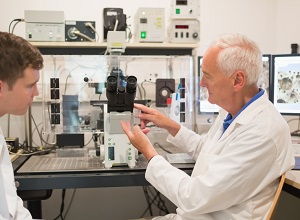Career - Biochemistry

More than 25% of the naturally occurring elements are essential for biological life. Biochemistry (also referred to as biological chemistry) is the study of the chemical make-up and chemical processes of living organisms. Biochemistry is considered an essential subject in any study of the biosciences. In a Bachelor degree, biochemistry (usually proceeding the study of first year chemistry) focuses primarily on the structure, function and interactions of large molecules including lipids, carbohydrates, proteins and nucleic acids as well as smaller molecules and ions. Biochemistry is often studied alongside highly related subjects including molecular biology and cell biology. Such subjects are usually taken together under degree titles including Bachelor of Science, Bachelor of Applied Science, Bachelor of Medical Science, Bachelor of Biomedical Science, and Bachelor of Biotechnology, etc. Many specialist subjects such as genetics, immunology, hematology and pathology require a background knowledge in biochemistry. Biochemistry career outcomes are predominantly laboratory based depending heavily on the particular subjects chosen (alongside general biochemistry) and the amount of time and the depth of the laboratory training components. Biochemists most commonly find employment in medical diagnostics, pharmaceutical drug design, and various sectors within the biotechnology industry. For those desiring a career in any of these fields it would be wise to include more advanced biochemistry subjects along with general biochemistry. For those considering a career in research, higher degree studies (such as Honours, Masters or PhD) are usually required. Those with an undergraduate background in biochemistry should possess relevant knowledge and skills applicable to just about any project area of higher degree study desired.














